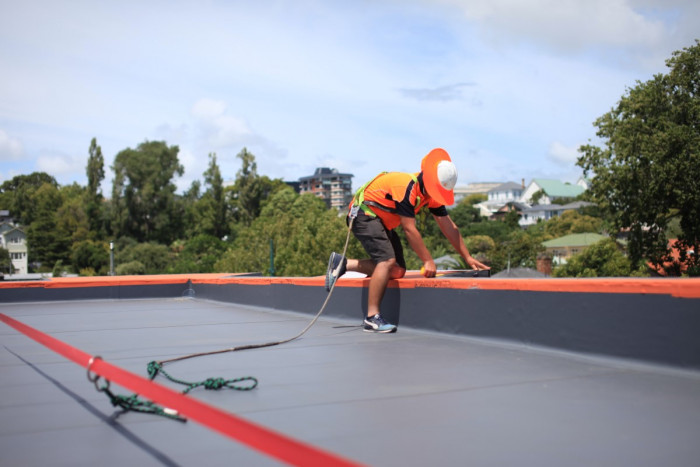Roofer
Kaihanga Tuanui
Alternative titles for this job
Roofers repair or install roofs using materials such as roofing iron, tiles and shingles.
Pay
Roofers with up to three years' experience usually earn
$24-$30 per hour
Experienced roofers or supervisors usually earn
$30-$40 per hour
Source: Roofing Association of NZ, 2019.
Job opportunities
Pay
Pay for roofers varies depending on experience, qualifications and location.
- Apprentice roofers usually start on the minimum wage, but earn more as they gain experience.
- Unqualified roofers with one to three years' experience usually earn between minimum wage and a little more.
- Qualified roofers with one to three years' experience usually earn up to $30 an hour.
- Experienced roofers or supervisors can earn between $30 and $40 an hour.
Those running their own business may earn more than this, but their income depends on the success of the business.
Source: Roofing Association of New Zealand, 2019.
- PAYE.net.nz website – use this calculator to convert pay and salary information
- Employment New Zealand website - information about minimum wage rates
(This information is a guide only. Find out more about the sources of our pay information)
What you will do
Roofers may do some or all of the following:
- select and estimate the amount of materials to be used
- measure roofs
- erect scaffolding and rig safety equipment
- remove old or damaged iron, tiles or other materials from roofs
- do minor repairs to the structure of roofs
- cut roofing materials to size and attach roofing and cladding to buildings
- install spouting, downpipes and flashing.
Roofers who run their own business may also prepare quotes and invoices for clients.
Skills and knowledge
Roofers need to have:
- knowledge of roof construction and repair
- knowledge of different roofing materials such as tiles, corrugated iron and butyl rubber (roofing rubber)
- the ability to read and interpret building plans
- understanding of the New Zealand Building Code and relevant roofing codes of practice
- knowledge of health and safety regulations, including the proper use of safety equipment.
If you’re more of a hands-on person, you shouldn’t hesitate to ask for help with the theory. I’ve made steady progress because I’ve got a good network of people.

Jack Kameta
Roofer
Working conditions
Roofers:
- usually work regular hours, but may sometimes work for extended hours and on weekends
- work on houses and buildings that are being built, repaired or altered
- work at heights and outside, except when conditions are too dangerous because of rain, wind or snow
- travel locally to jobs.
What's the job really like?

Jack Kameta
Roofer
People skills create opportunities
Making friends with the roofers while working as a building labourer was the best thing Jack did for his career. "My job was ending and they said 'Why don't you jump waka and come with us?'"
Jack was offered an apprenticeship at Metalcraft Roofing that he couldn’t turn down. "I've got a family with three kids so I needed more certainty."
Five years later, Jack has gained many skills working on residential and commercial roofs.
Keeping fit and working with others are the best parts of roofing
Jack's happiest memories involve teamwork. "Rotorua K-Mart was a huge roofing project. It was cool because all 11 of us were there. But more often we travel around the Bay of Plenty and work in smaller teams.
"I also like the way roofing is a physical job and you get to keep fit. And the challenges are rewarding too, especially making the flashings watertight on steep roofs."
Working hard can lead to more pay and responsibility
"You learn the basic roofing skills but then it's up to you to watch the site foreman and give it a go. If you put your head down and mahi (work hard) there is good money in roofing, and opportunities to learn.
"I'm at the stage now where I'm trialling a foreman’s role. I'm running my own jobs, and responsible for the workers and keeping the customers updated."
Jack Kameta is of Ngāti Pikiao descent.
Roofer video
Sam talks about life as a roofer - 1.20 mins. (Video courtesy of Got a Trade? Got it Made!)
Your apprenticeship can take anywhere from a year to two years. It’s probably the best decision I made going for qualification. It’s opened a lot more doors for me. After getting qualified I’ve set up my own business and that’s been running for about eight months now and has done really well. My lifestyle has gotten a lot better because of roofing, I make real good money.
I think the type of person that makes a good roofer would be someone that really enjoys the outdoors, I guess they love physical work, love being practical, gotta love heights! Hopefully you love heights.
The demand out there for roofers now is huge. A lot of guys are looking for young roofers to start apprenticeships. I’d say to a guy wanting to become a roofer to go for it. It’s taken me places, I have enjoyed being an apprentice and I have also enjoyed being qualified now with my own business, so yeah, go for it.
My name is Sam, I’m 28 and I’ve got it made.
Entry requirements
There are no specific requirements to become a roofer as you gain skills on the job. However, many employers prefer to hire roofers who have or are working towards a qualification.
To become a qualified roofer you need to complete an apprenticeship and gain a New Zealand Certificate in Roofing (Level 4).
Industry Connection for Excellence (ICE) and Vertical Horizonz oversee apprenticeships for for roofing.
- Industry Connection for Excellence (ICE) website - roofing apprenticeships
- Vertical Horizonz website - roofing apprenticeships
- More information about apprenticeships
Secondary education
No specific secondary education is required for this job, but construction and mechanical technologies, maths and physical education to at least NCEA Level 2 are useful.
Year 11 and 12 learners can find out more about the construction industry, and gain relevant skills, by doing a National Certificate in Building, Construction and Allied Trades (Level 1 and 2) through the BConstructive programme.
For Year 11 to 13 learners, trades academies and the STAR and Gateway programmes are good ways to gain relevant experience and skills.
These programmes may help you gain an apprenticeship, but do not reduce the amount of time it takes to complete it.
Personal requirements
Roofers need to be:
- safety conscious
- comfortable with heights
- quick and efficient, with an eye for detail
- able to follow instructions
- able to work well as part of a team
- good at basic maths
- organised.
It helps to be good with heights because when you first start it can be a bit scary walking along 70mm-wide framing. But you learn how to keep safe with harnesses and safety netting.

Jack Kameta
Roofer
Useful experience
Useful experience for roofers includes any work in the building and construction industry, especially plumbing and carpentry.
Physical requirements
Roofers need to have:
- excellent fitness and health and must be strong as they lift heavy building materials
- good hand-eye co-ordination
- a good sense of balance.
Registration
Some roofing work has to be carried out or overseen by a Licensed Building Practitioner.
Find out more about training
- Industry Connection for Excellence (ICE)
- 0508 442395 - https://icexl.co.nz/
- Vertical Horizonz
- 0800 723 3848 - roofing@vhnz.co.nz - www.verticalhorizonz.com
What are the chances of getting a job?
Growth in building work means good opportunities for roofers
Chances of getting a job as a roofer are good due to:
- moderate growth in construction predicted to extend until at least the end of 2023, meaning more roofing work
- the Government’s KiwiBuild programme, involving the building of quality affordable homes over the next decade
- building work needed to upgrade leaky homes and earthquake-prone buildings.
The Christchurch post-earthquake rebuild is ongoing but most of the remaining work is in the non-residential (commercial) sector.
According to the Census, 3,696 roofers worked in New Zealand in 2018.
Shortage of roofers
Roof tiler appears on Immigration New Zealand's regional and construction and infrastructure skill shortage lists. This means the Government is actively encouraging skilled roofers from overseas to work in New Zealand.
However, like many building jobs, this role can be affected by economic conditions. A downturn in the economy can lower demand for roofers.
Record number of apprentices but demand still strong
The number of apprentice roofers has grown steadily but there are still not enough qualified roofers to meet demand. Around 80% of roofing apprenticeships are offered by members of the Roofing Association of New Zealand.
You can increase your chances of getting a roofing apprenticeship if you have:
- a good attitude to work, good time management skills, and are willing to learn
- completed a Gateway or pre-trade programme
- the ability to use hand and power tools
- building or other trades experience
- a tertiary qualification but want to retrain in roofing.
Most roofers work for specialist roofing companies
According to the Roofing Association of New Zealand:
- 40% of roofing companies are small businesses with between two and five staff
- 45% employ between six and 15 staff
- 15% employ 16 or more staff.
Sources
- Immigration New Zealand, 'Construction and Infrastructure Skill Shortage List', 27 May 2019, (www.immigration.govt.nz).
- Immigration New Zealand, 'Regional Skill Shortage List', 27 May 2019, (www.immigration.govt.nz).
- Moor, G, chief executive officer, Roofing Association New Zealand, careers.govt.nz interview, February 2019.
- Stats NZ, '2018 Census Data', 2019.
(This information is a guide only. Find out more about the sources of our job opportunities information)
Progression and specialisations
Experienced roofers may progress to set up their own business.
Roofers often specialise in either residential or commercial roofing, or a particular kind of roofing material, such as:
- tiles
- shingles
- longrun metal roofing
- architectural tray roofing
- insulated panelling
- membrane roofing.
Last updated 25 March 2025


